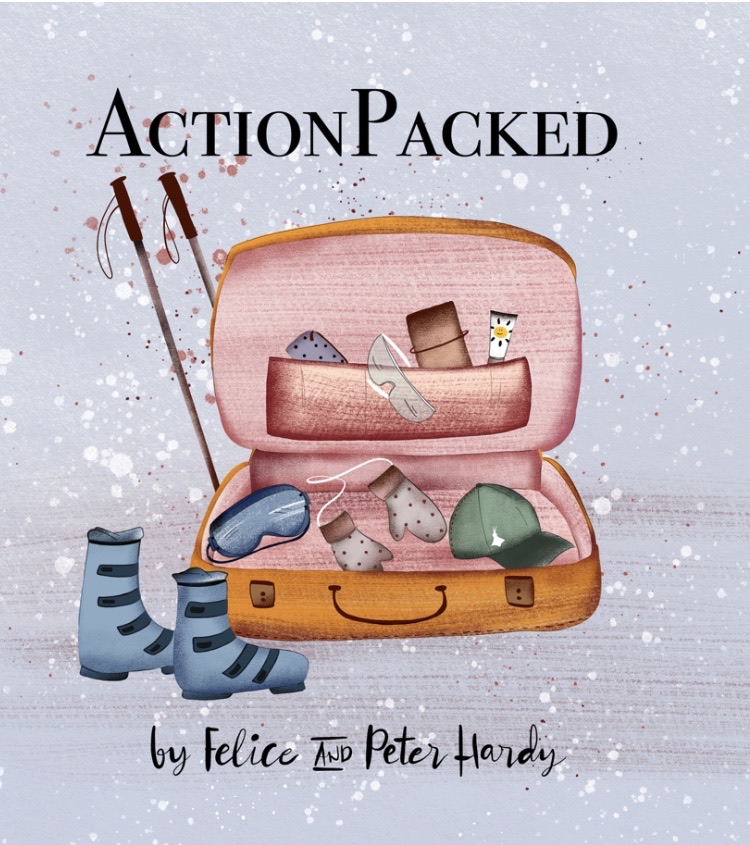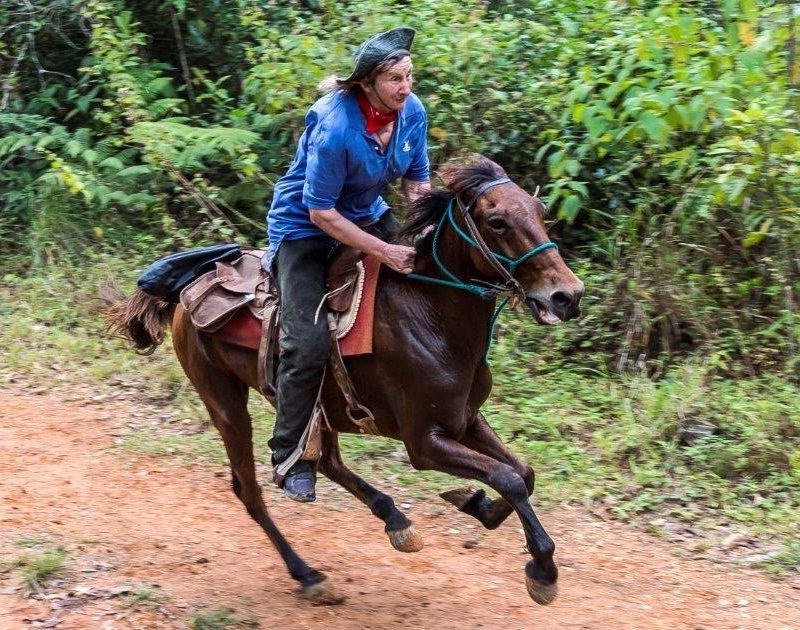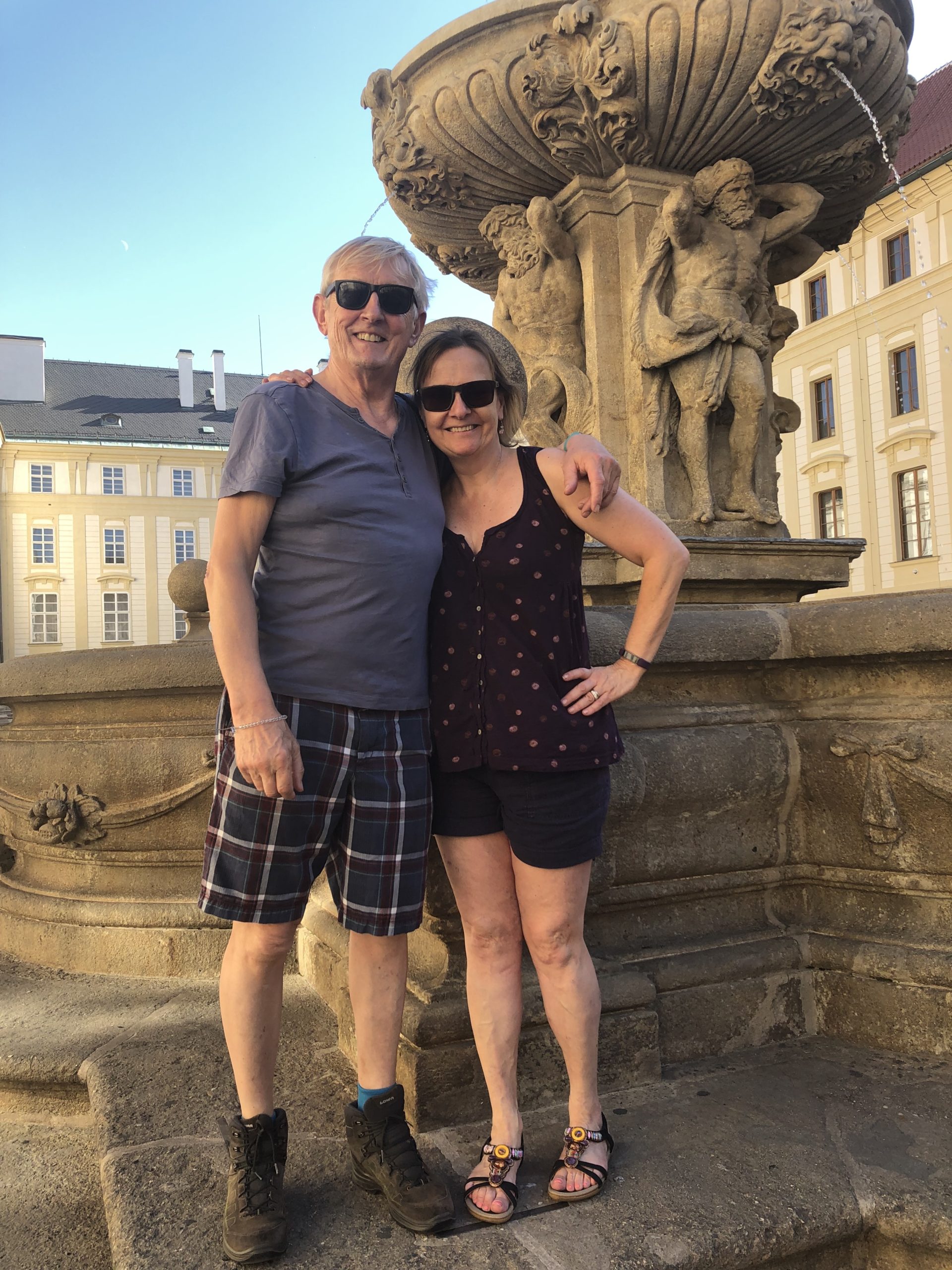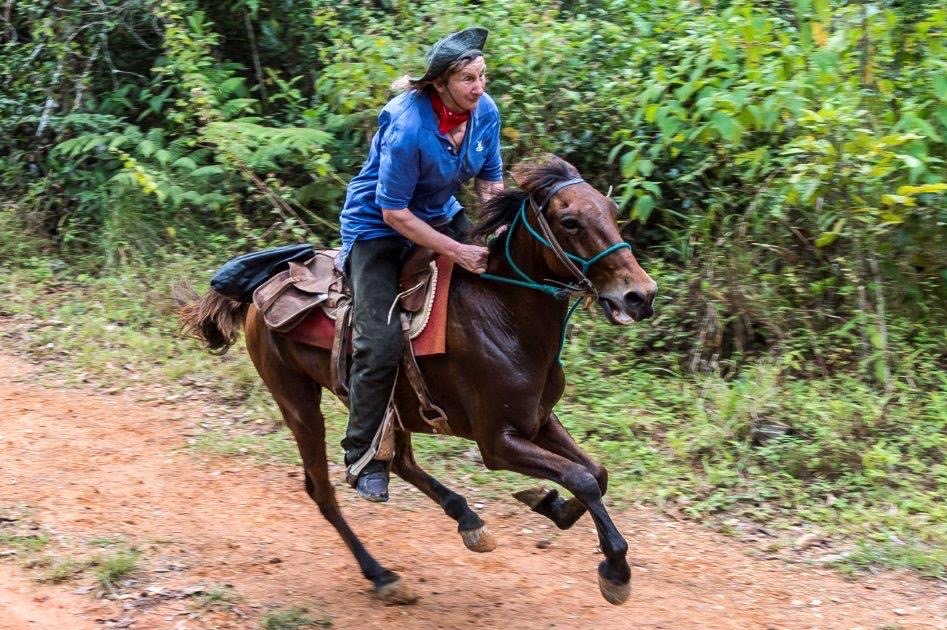
Minty in Cuba. Photo: © R.Dunwoody
Today, we’re talking face to face – a welcome change from Zoom – with indefatigable travel writer Minty Clinch. For the past 30 years, Minty has ventured on horseback to some of the wildest corners of the world. But that’s just a single facet of a truly remarkable life of action packed adventure.
Peter Minty, welcome to our travel podcast. Increasingly, you remind me of one of those intrepid 19th century female explorers like Mary Kingsley or Lady Hester Stanhope, emerging alive and well from the Empty Quarter on a camel after three months alone in the desert. How did this urge to travel come about?
Minty Well, as an Irish peasant, I was always contrary by nature. So in my childhood, we never travelled anywhere, we never went to the cinema. So I decided in the end I would make careers out of doing those things which I always wanted to do and couldn’t. So my liking for adventure travel started in the classroom, when I was about ten in the geography lesson and we had a picture of a communal hut on the banks of the Amazon. And I looked at it and thought: ‘One day I will be there.’ Sixteen years later, I was. So that got it kicked off, but was quite a difficult journey from a family that didn’t travel.
Felice How did you get into journalism?
Minty Well, when I was a teenager, people would always say: ‘What do you want to do when you grow up?’ And no women in my family had ever worked, so I had very little idea of what career openings there might be. But I liked the sound of journalism, and I could write nice essays. And I thought journalism – it was vanity really – sounded good to me.
Peter And how did you actually get into it? You worked as a film critic, a very well-known film critic in the ‘80s and ‘90s.
Minty Well, I was more an all-purpose film hack. I worked on a lot of locations for films and I wrote unauthorised biographies of American superstars.
Peter Who did you write about?
Minty Clint Eastwood and Robert Redford. The first one was James Cagney – obviously I didn’t meet him because he was not available to authorise it by that time. And Burt Lancaster and Harrison Ford. So five of those. I met Harrison Ford several times and Clint Eastwood several times and Robert Redford once. But they were all very nice when they were young.
I went to Hollywood when I was starting out on my first great adventure travel, and I didn’t really know anything about the film industry then. So I rang up Universal Studios and said: ‘Have you got anyone that I can interview?’ And they said: ‘Well, you can interview Clint Eastwood, if you like, at four o’clock this afternoon.’ So I borrowed my friend’s car, totally terrified, turned up at the studio and was ushered to Clint’s bungalow where he was with Jean Seberg, who was his current squeeze. And she, of course, looked furious because I was younger than her, naturally not so beautiful. And Clint was charming and we had a very nice chat and a beer.
But later on, he got quite…. they get power hungry these people, I’m afraid, it does go to their heads. Harrison Ford as well – he was very pleasant and unassuming when I first met him after the Star Wars films when he was making Raiders of the Lost Ark. But later on, he got quite grumpy. He got richer and that’s the problem – power does corrupt.
Peter So you went from there as a film critic and then you branched out towards mainstream travel?
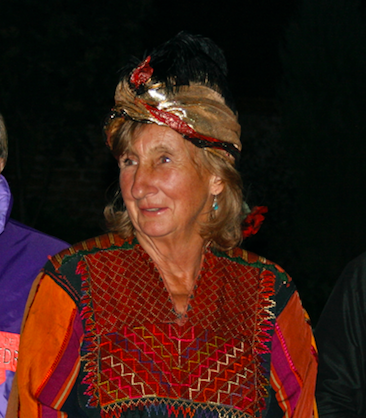
Minty Yes, that happened. In the ‘90s, the film industry changed and the jobs I’d had – films where I hung out for six weeks like I did on the Killing Fields, for example, in Thailand – stopped because they started to cut the budget, so there was no longer any work. I worked for the producers, David Puttnam and people, writing notes and background material so they could use it when they wanted to publicise a film. So that was a wonderful job because I talked to the actors all day because they never had anything else to do either, while other people slaved.
So that sort of thing came to an end and the publicists became much stricter about what you said about people in the interviews. So if you interviewed Clint Eastwood and said anything bad about him, I mean not anything vicious but just slightly non-positive, he would make Warner Brothers refuse to let any of their people be interviewed. So that was very restrictive.
Then some friends of mine, one took up free-skiing as a profession…as a journalistic profession. And when I learned that you could do that, I thought I might start skiing again and do the same.
Peter You skied as a child, did you?
Minty No, I didn’t; I skied at university. Then I did a term at Grenoble University and I went to university parties and I’d skied very little at that time, although of course I thought that I was wonderful, but I’d done enough to be able to work on it. So that was fine. And then my husband died in 1998 and after that I thought I might…I’d always said when I was older I’d travel full-time. So I took up the rest of it: global travel, adventure, riding, just going to places where not many people go.
Felice Riding – when did you actually start riding?
Minty When I was two. We had a pony called the Nipper, a Shetland pony in the War. I just rode around. So I’d always ridden, it’s not something that I find difficult. It comes more natural than most things – certainly, more naturally than golf, which is another thing. So when I grew up, I used to have horses to event – just one horse rather. I used to drive out from London and take it to one-day events, rather unsuccessfully. But it eventually led to me writing ghosted autobiographies of Mark Todd – Sir Mark Todd, and William Fox-Pitt, leaders of the three-day event in the world.
Felice And what was your first riding trip?
Minty The first one actually was in Georgia. We went skiing in Georgia and I met this man who sold cornflakes to Russians, and he and his family went for a riding holiday in the mountains in eastern Georgia, which was amazing. We camped, galloped about the mountains at full speed…very, very exciting. We met Chechnyan rebels and we were given a fuselage from local troops as we rode out in the morning.
Felice And you had a trip to Ethiopia at one point?
Minty Yes. Well, that wasn’t riding – a press trip. But there I met Jonny Bealby, who founded a company called Wild Frontiers, which was a cutting-edge adventure travel company at that time. He was a proper traveller; he had written books about riding motorbikes through Africa and on horse from Kashgar to the Caspian. He was a real traveller as opposed to a commercial person at that time, and so it was a small niche company and he was bringing his customers into the hotel we were staying in for breakfast.
So I met him in the doorway and then I followed it up when I got back, and I got a commission from The Times to go with him to Pakistan – the first trip after it had been closed to travel for about four years due to conflict with India. So we went to the north and it wasn’t riding either – we were in Jeeps – and one thing led to another. So then he offered me a trip for another paper to Kyrgyzstan, and that was when I met Richard Dunwoody.
Richard was in the ’90s a top steeplechase jockey, in the ’80s and ’90s he was champion national jockey three years in a row, and he’d ridden most national hunt winners of that time, and he’d won the Grand National a couple of times. But he’d had to retire early because he had a potentially paralysing injury to his neck. So he had started leading riding holidays, and he was leading that one when I went on it, and we always got on very well. It was the start of a long travel relationship that’s taken us to many places around the world, always very enjoyably.
Peter And where in the world did those other riding adventures take you?
Minty Well, the next one I did was with him to Tajikistan, which was a three-week trip, I think, it was quite long…four weeks he was supposed to go. We ran out of food.
Peter That always adds a certain interest to any trip.
Minty And we were supposed to get on and go through to Afghanistan, but we ran out of food. Yes, and the demographic for riding holidays is there’s eight probably, middle-aged to older-aged women from England, half of whom could ride and half of whom couldn’t ride at all. So there’s always a certainly diversity of aspiration.
Anyway, we went up into the mountains. We normally had support vehicles, but we’d abandoned them. So this particular stretch we went up into the mountains and the Italian who was co-leading the trip, Dom, he’s surveyed the landscape from the Aga Khan’s helicopter in spring when it was all covered in snow. So he thought there’d be alpine pastures underneath, in fact there were huge boulders so it was very bad for riding. And we had one tent which we slept in and some of them slept outside, but I was not that stupid because it was 4600 metres and extremely cold. And then we ran out of food. So then Dom, who was a good operator, went off to the local shepherds and said: ‘Could you sell us sheep to eat?’
And they said yes, because we’d go out and we could cook it. So he came back and asked the assembled company if they could have sheep. And there’s all the women all said: ‘Oh no, we couldn’t eat a sheep that’s alive now.’ And so Dom went back and ordered half a sheep – and of course five hours later when it appeared everybody wanted it. All the scruples have been suppressed, so we didn’t get as much as we’d hoped…we the carnivorous ones…felt a bit cheated on.
So then the next day we cracked on and eventually we saw the welcome sight of a man standing on a rock holding a bottle of vodka. So they’d found us. We then managed to descend to the camp, get back together with the support team, which was a great pleasure. Then there was a schism the next day while everything fell apart and Dom wanted to keep the troops with him. And Richard wanted to go on to Afghanistan, which was the schedule and which we’d all got visas for. So we had a bitter split-up and half the people stayed with Dom, and Richard and I kidnapped the Belgian couple who wanted to go to Afghanistan and we went on alone, and that was great but it was not considered proper behaviour of course, in the greater scheme of things.
Peter And then self-drive around India?
Minty Yes, Richard and I did that later. That was one of my projects when self-drive came in. We flew to Calcutta and then we went up to meet the car, set off for Darjeeling, and in fact turns out very difficult to self-drive in India.
Peter Well survival on the roads is quite tricky…
Minty Well, also, those trucks with no lights and people on rickshaws, cycles and pedestrians, and it’s just mayhem. But if you want to try self-drive in India, there’s no better person to be driving than a steeplechase jockey who’s used to squeezing large moving items like horses through narrow gaps. And so, in fact, Richard was brilliant at that. And I did a certain amount of driving. We had another friend, an Australian girl who we’d met in Mongolia on another riding holiday, and she couldn’t drive because she’d never driven a car with stick shift, so didn’t seem the place to start. So she didn’t drive, but it was very exciting. But when I asked Richard if he’d come on another one for a film and he said: ‘Certainly not,’ but I enjoyed it.
Peter And then you’re one of the few people who’s been to North Korea in recent years?
Minty Yes, that was Richard’s project. He said, ‘I’m going to run the marathon in North Korea. Why don’t you come?’ I said, ‘Yes, why not. I’ll come.’ So we flew to China and then up to Pyongyang. And the next day he ran in the marathon and I ran in the 5km limp – all categories were catered for – and it was like being at the Olympic Games. We were there in the middle of the ski stadium, some dignitary came out and made a speech of welcome, I assume. Then we all set off in groups out of the stadium and then everybody came back later when it had been run.
Peter So that was amazing experience being in North Korea?
Minty Yes, it was extraordinary being in the stadium -–of course nobody would come, it wasn’t allowed. So the stadium was filled with soldiers – every seat – who were forced to sit throughout this procedure. But they did very kindly lay on a football match when the marathon runners had come back. So it was brilliant, a really good experience. North Korea, we went for a ten-day trip after that in our bus, with our intensive schedule and our three minders. I mean you don’t, as it as everybody would know, travel freely in North Korea. You only see what they want you to see; you have to accept that if you want to go there. But we had excellent food, much the same as in South Korea. Plus the dog stew, of course, which was offered. I was unable to eat that, but several of my travel companions did that. Our trip was brilliant, they were aged 23 to 79 I think, the people on it, from 13 countries – 20 people from 13 countries.
Peter And they were all just tourists. You were travelling as a tourist?
Minty No, they were all marathon runners. I did write an article about it, but you’re not really supposed to do that until afterwards. But the travel company in the end agreed that they would love to have the publicity. Koryo they’re called, they’re actually very good if you want to go to North Korea, which I would strongly recommend on interest levels. We went out to the Sea of Japan, then down to the mountains, so it wasn’t just Pyongyang…and the DMZ of course.
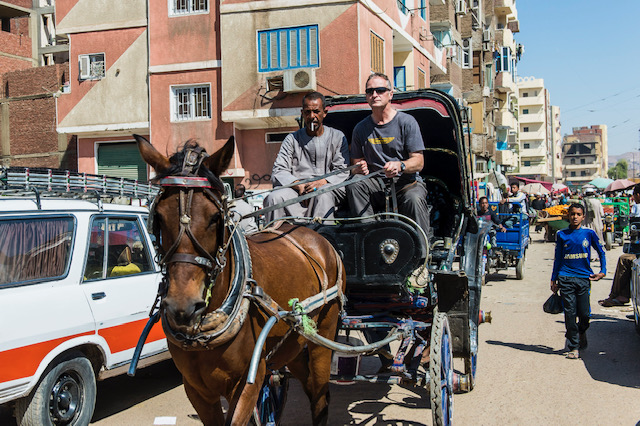
Richard Dunwoody taking the reins in Aswan
Felice And on another trip, you went overland from Khartoum to Cairo?
Minty Yes, that was a Wild Frontiers trip actually, to Sudan. We went out to see the pyramids at Meroe and so on, and camped. And then Richard and I did, for the Financial Times, a journey in the footsteps of Kitchener and we took the train through the desert up to Wadi Halfa and then across the lake in a very leaky ancient boat, which show had at one time sunken and drowned all its people, but luckily it didn’t when we were on it. And then we arrived in Egypt at Aswan and then went on the Nile to Luxor, in the boat stopping it off at archaeological sites, which was lovely. And then took the train up to the Pyramids of Giza, then came home so that was a nice adventure.
Felice And another one you did was to Cuba?
Minty Yes, we did a riding trip to Cuba. We stayed in a beautiful place which had been built in 1955 in the Batista era just before Castro’s. And it was a stud farm – they bred working horses because the Cubans love their horses, they have a lot of those. And they also have a rodeo in Havana, which they bred them for that. So we had lovely horses and we stayed there. They had cockfighting, which was a bit depressing but, of course, interesting to see.
Peter Yes, I’ve seen that many years ago in Peru many years ago. Not a nice spectacle.
Minty Yes, it is pretty nasty it is not pleasant. It is pretty nasty, actually. But it’s quite interesting to see the locals better and screaming. And then my passport…it was stolen…so I got an extra week.
Felice Was it difficult to get another one?
Minty Well, I couldn’t get another one in Cuba. It was just before Easter so I had to wait until after the holiday before I could even get to see the consul to get a piece of paper to get back into the country. But that was achieved eventually. Expensive, I had to buy another flight and so on.
Peter And then you went to Mongolia?
Minty Yes, I went twice we went twice to Mongolia, both times with Richard. The first was just quite a tame little circuit of upside Ulam Bator. And then the second time we went up to the reindeer people on the border with Siberia where they live. There is a Shaman up there who tells fortunes, which is a voodoo type of arrangement. So we rode through various sodden forests some days to get there. And then we raced across the plains afterwards and we managed to get out to Lake Hovsgol, which was lovely. So that was quite an adventure because there are deep bogs everywhere and huge horseflies.
Peter Sounds like a nightmare.
Minty And somebody fell off and broke their collarbone in the middle of nowhere. It was desperate to try and get help and morphine, which is what you need in these situations. and it was not available to us – until help arrived in the form of a Mongolian woman who couldn’t speak a word of English. Anyway, everybody survived, it was fine in the end. And then we went…that was the years 2009 and the first Mongol Derby.
The Mongol Derby was devised by Tom Morgan, who’s started a small company called the Adventurists – a niche company. He started out with among the rally here, which had an element of charity in his thing, so he’s raised over a million for his charity. The Mongol Rally started in Britain. People had to buy a car costing less than £100 and drive it out as best they could to Ulam Butor, and when they got there, there was a big party; Tom’s a big party man. So that went on for several years and it was pretty popular, mostly with the university students – so not very rich young people with a lust for travel. And then they had to give the Mongolians the cars.
However more recently, the Mongolian lust for ancient cars dwindled, so that no longer happens I don’t think. But Tom then started the Mongol Derby, which was based on Gengis Khan’s postal system, which was legendary and actually stretched from the Sea of Japan to the Caspian in the early 1200s. The system was it was a relay, of course. In the Mongol Derby the riders had to ride 40km on one horse to the next urtu, which is a horse station. Then they would change to another horse – the ones who got there first got the best ones. And that went on for about ten days and they rode for 1000km across the Steppes, which was magnificent. Richard started that race. I suppose as GPS to find the way. But no, it was very successful and it’s been over-subscribed ever since…and it’s still going on.
Felice And another trip you did was to Patagonia. Is that that was your most recent trip?
Minty Very lucky to get it in – went out in late February and came back in early March just before lockdown, and this was another Adventurists project. In the meantime, Tom had started the Rickshaw Run in India, which was a race in rickshaws as it sounds, and the Monkey Run in Peru, which was on motorbikes in the mountains in Peru in the Andes. So now he wanted to roll out the derby concept in Patagonia.
So he arranged to stage the Gaucho Derby, which was a very different sort of event, was only five legs, about 500k through the Andes and in the southern part of Patagonia, where the weather is generally brutal. So it was based in El Khilafah and it started seven hours drive to the north. It was the first horse race where the riders had to take a packhorse. So they rode into the mountains with a packhorse and huge bails of hay on the sides so the two horses would have something to eat while they ploughed through the mountains towards the first horse change spot, which was 80km away.
They always have vet stations that check that the horses were alright, but the medical support was less satisfactory. In Mongolia of course, it is pretty open so you can get a car up pretty quickly to help anybody. But in the Andes, you can’t. So the rider, the medical staff, had to ride in for five hours at least to reach anybody that got injured. It was all quite hazardous.
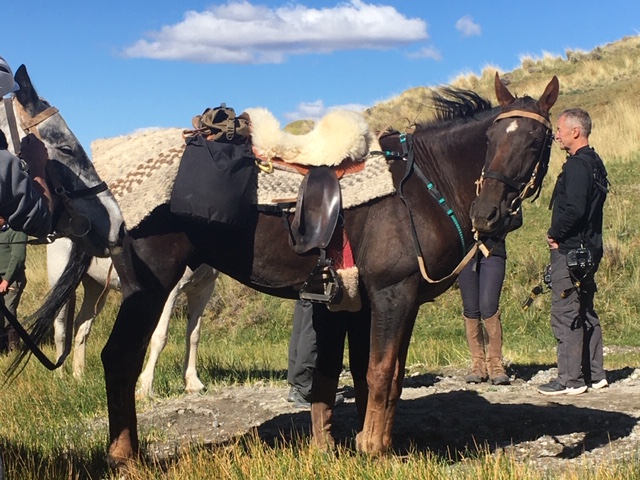
Getting ready for the Gaucho Derby
Peter So have you ever been injured yourself on any of these trips?
Minty Yes, but only skiing really.
Felice I think you’ve had a nasty experience in Ljubljana?
Minty Yes, I had a car crash, actually I was skiing, but I was driving on the motorway at eleven o’clock in the morning in beautiful sunshine. I pulled over to read the map, which was very tricky in Slovenia because of the spelling. So I was parked up on empty motorway on the hard shoulder, and a man drove into the back of me – a Croatian man – he shunted the car straight across the two lanes into the central reservation. So I was lucky that it was an empty motorway. Quite why he did it I don’t know.
Anyway, I ended up in a clinic in Ljubjana for nine days, and they didn’t have much English there. So there was a nurse, a rather brisk nurse who was immune to other people’s pain and she didn’t know much English, and what she didn’t know was three words: ‘You may die.’ She seemed to enjoy saying that.
Peter And you obviously didn’t and came back and made a full recovery from that.
Minty Yes, I did. I had three more weeks and an operation in the Brompton before I could start doing that – two collapsed lungs.
Peter So indeed ‘you may die’ was quite a serious statement?
Minty Yes, it was I think possible at one stage. I think she meant it. She possibly hoped it was true.
Felice But since then, what do you do to keep fit for all these trips?
Minty Well, 40 years ago I interviewed John Cleese and I was writing about movies, obviously, and he said: ‘You should take up Pilates.’ And I said, ‘What?’ having never heard of Pilates. And he said what it was. And then I said, ‘Why?’ And he said: ‘Well, you’ve got a long back like me, so you’re sure to have back problems.’ I said, well, I don’t have back problems.’ So 40 years later, I still don’t have back problems, but I have taken up Pilates just before Covid struck and I’m much fitter than I was, as are many people, I think. I have a teacher called Beverly Skull who’s excellent, so now she does Zoom classes. So I’ve been doing that because we’re all thrown onto our own resources to do things like that. So I’ve done a lot of cycling. Now, of course, I’m back on the golf course so I can walk around…that’s quite fittening. I take the dogs for a walk; I’m not very keen on walking without dogs. I have to say, I’m not a great hiker unlike the rest of the planet. I was skiing this year before lockdown, so I’m reasonably fit.

Minty playing golf in Austria
Peter And then golf has been an important part of your life?
Minty I’ve been lucky with golf. I have possibly the least talent for golf of almost anybody I’ve ever met. But it’s been very good to me, I‘ve done a lot of press trips for golf. It’s good fun, quite different to riding because all the people on golf press trips are men and they talk about football and drink beer. But I have no problem doing so. I don’t mind. I don’t think they mind having me along. They probably certainly not for the football and the beer, they might rather not have me on the golf course.
Peter So that’s taken you all over the world?
Minty Yes, I’ve played golf and I think well over 50 countries, including Pakistan, New Zealand and Peru and lots of places. If there’s ever a gap when I’m near a golf course, I’ll go and play on it.
Felice And how about the future? Do you have anything in the pipeline?
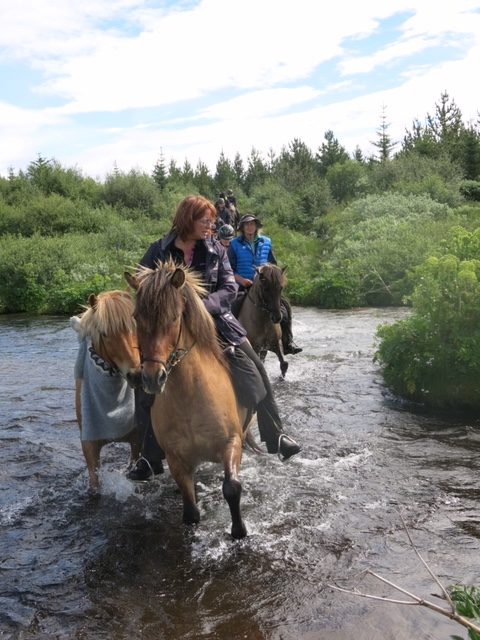
Riding in Iceland
Minty Well, Covid’s really brought the future to a halt as far as travel’s concerned, because we don’t know what will possibly end. And my husband was involved in a charity, and so there are plans to go to central Vietnam next year to raise money for the Montagnard people who are disadvantaged citizens of Vietnam. Otherwise, I don’t know.
Peter But after this time, three months of lockdown, you’re raring to go, still want to keep travelling?
Minty Well, I would like to, but one has to find the right projects and someone to support it, which is increasingly difficult. As the travel industry struggles with things which it has no means of coping with because it has no knowledge of what’s going to happen. So it’s difficult times and I think the travel industry is already under some pressure and can only be intensified.
Peter Your first serious travel adventures after university, going to South America?
Minty Well, there were three years in between, when I worked in London, I sold advertising space and I had a job on 19 magazine at the beginning of my fledgling journalistic career. Then one winter’s day when I was in the office doing nothing as usual, I thought there must be better things to do with your life than this. I took a year out and went to America. I started in North America on a Greyhound bus and then travelled by train down to Mexico and then spent three months there travelling round.
And then I flew to Colombia and I met a Frenchman who was planning to hitchhike through the Andes, and he wanted someone to speak Spanish to interpret for him and so we travelled together. So he taught me to hitchhike. And in those days, it wasn’t very difficult actually in Colombia because we just walked out of the place we were staying to the edge of the town. And there would be a police post with armed men and they would stop the next lorry or truck and say, ‘Where are you going?’ And if it was where we wanted to go, they would wave the weapon at the driver and say, ‘Well, these people would like to go with you.’ So it was sort of non-negotiable.
Peter Yes, I remember very well much the same thing. I also hitchhiked to South America and I had all sorts of adventures like that. Is it the help of the local police or military?
Minty They were all military dictatorships. And they were very nice, often they had beer to offer us. The French guy who was called Guy, he knew how to travel for free. He had just come from the Paris riots in ‘68. He was a sort of revolutionary type of person coming to do good in South America, and he had learned that you could. So I was supposed to ask in my rudimentary Spanish if we could stay in schools and barracks. We stayed in a barracks in Quito, where it was like a dormitory with about 60 soldiers and him and me, and that sort of thing, So we got very good at that, actually.
And then in the end, he went off to north east Brazil, to Recife to help Dom Helder Camara, who was a revolutionary bishop, and I went on down to Chile hitchhiking, then to Bolivia. And eventually I got down to Ushuaia and down the Amazon, so that was it, most of it was solo travels. So that was what really taught me to travel, that you should feel at home anywhere, that’s the key to it I think – that you shouldn’t worry.
Peter Any key tips for travellers?
Minty Well, that’s the main one: don’t worry. if you’re in a situation where it’s not working out, just wait and see if it does. I mean, if you’ve travelled neurotically worrying when the next bus is coming, you are going to be anxious all the time and then it’s no fun. You have to let it take you where it will.
Peter Minty Clinch, thank you very much for coming on the show. We wish you the very best with your future travels.
Minty Thank you for having me.
Felice That’s all for now. If you’ve enjoyed the show, please share this episode with at least one other person! Do also subscribe on Spotify, i-Tunes, Stitcher, or any of the many podcast providers – where you can give us a rating. You can also find us on Instagram, Facebook and Twitter. Stay safe and we’ll see you next week.
See also The Misadventures of the Adventurists, and for a different kind of horse racing, click here.
© ActionPacked Travel

- Join over a hundred thousand podcasters already using Buzzsprout to get their message out to the world.
- Following the link lets Buzzsprout know we sent you, gets you a $20 Amazon gift card if you sign up for a paid plan, and helps support our show.
